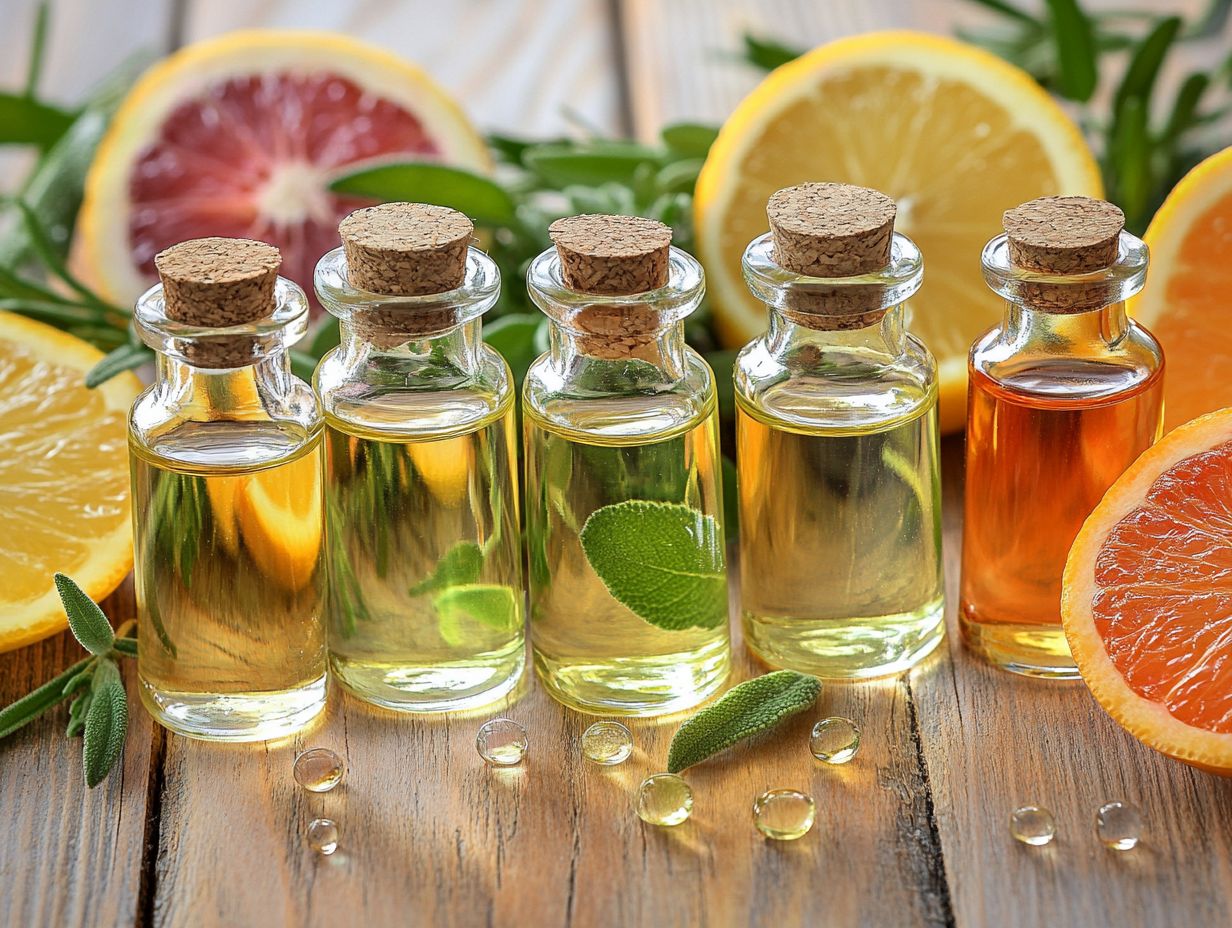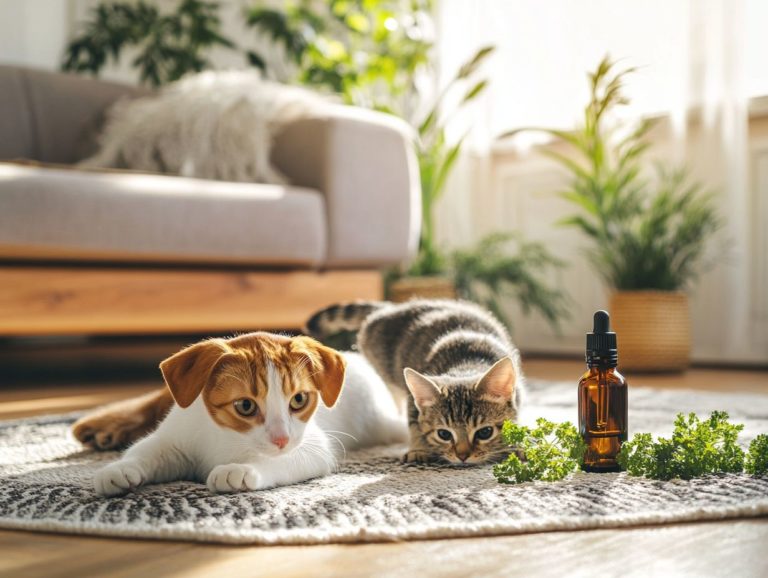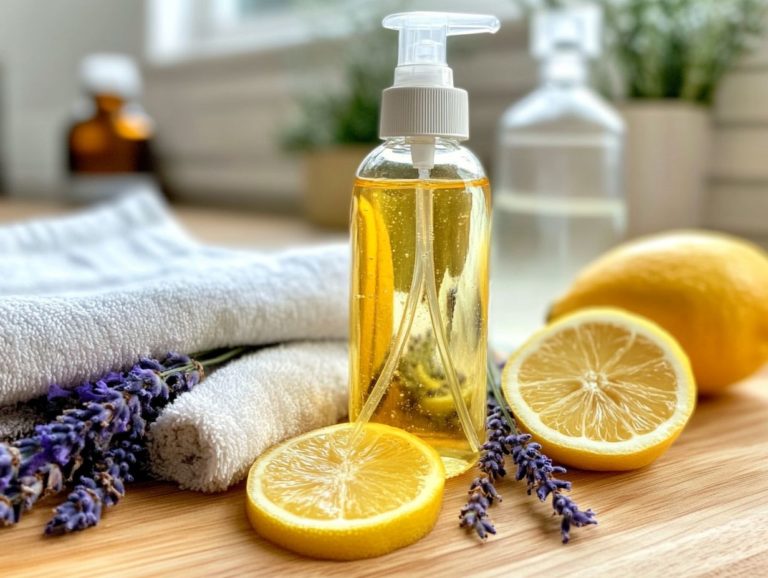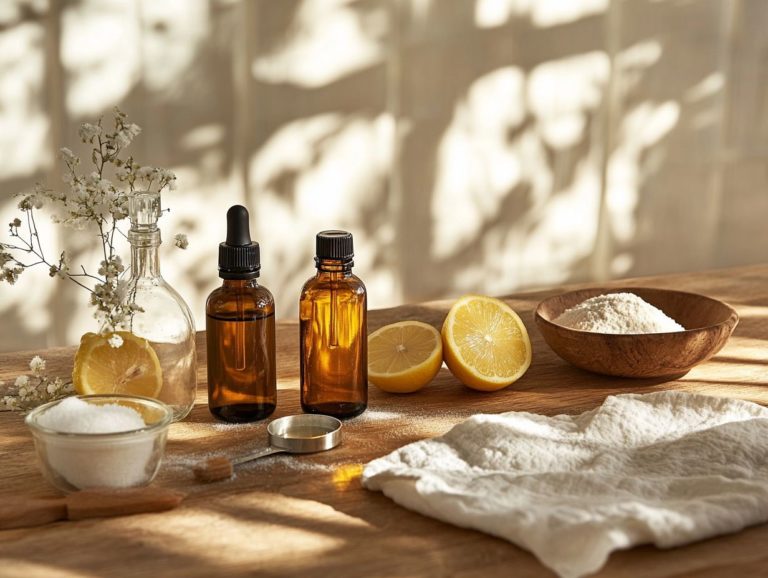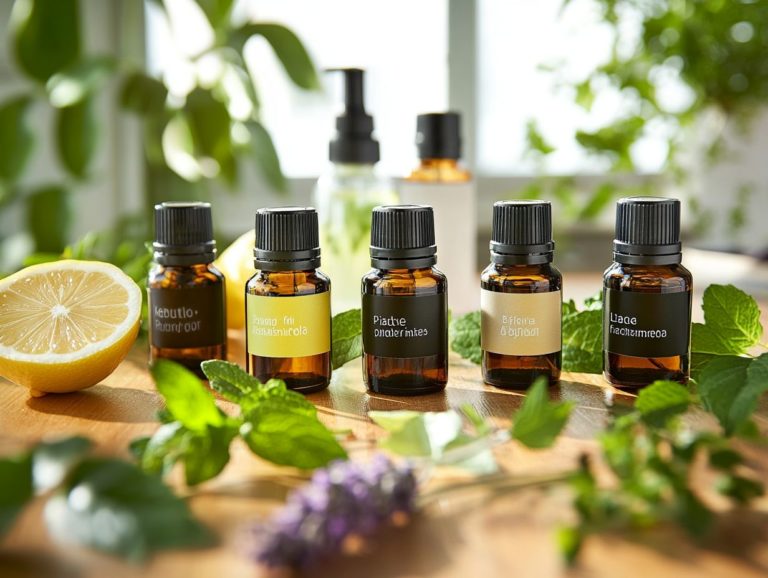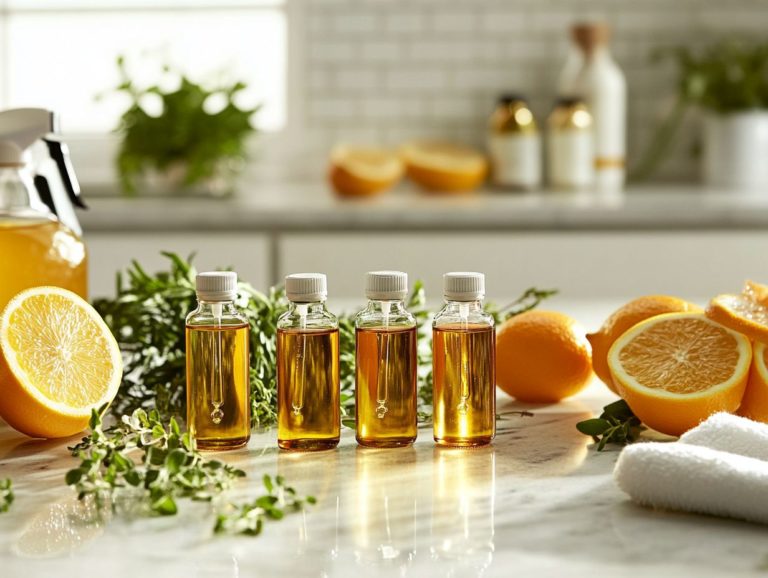5 Essential Oils That Naturally Kill Germs
In a world where cleanliness is paramount, you may seek natural solutions to disinfect your home effectively.
Essential oils are celebrated for their delightful fragrances and remarkable germ-fighting properties. Frankincense oil and lemongrass oil provide unique benefits for both health and home.
This article explores five powerful essential oils Tea Tree, Eucalyptus, Peppermint, Lemon, and Lavender that can help you keep those pesky germs at bay. You ll discover their unique benefits, practical tips for safe usage, potential risks, and ways to seamlessly integrate them into a holistic lifestyle. Furthermore, learn how aromatic oils like orange oil and rosemary oil contribute to cognitive function and mood improvement.
Discover how these aromatic oils can transform your cleaning routine and boost your wellness! Try incorporating these oils into your daily routine today!
Contents
- Key Takeaways:
- 1. Tea Tree Oil
- 2. Eucalyptus Oil
- 3. Peppermint Oil
- 4. Lemon Oil
- 5. Lavender Oil
- How Do Essential Oils Kill Germs?
- What Other Essential Oil Benefits Do These Essential Oils Have?
- How Can Essential Oils Be Used for Cleaning and Disinfecting?
- Are There Any Risks or Side Effects of Using Essential Oils for Killing Germs?
- What Are Some Other Natural Ways to Kill Germs?
- Want to enhance your healthy lifestyle? Incorporating essential oils can do just that!
- Frequently Asked Questions
- What are the top 5 essential oils that naturally kill germs?
- How do essential oils kill germs naturally?
- In what ways can I use essential oils to kill germs?
- Are there any precautions I should take when using essential oils to kill germs?
- Can essential oils replace traditional cleaning products for killing germs?
- Are there any essential oils that should be avoided when trying to kill germs?
Key Takeaways:
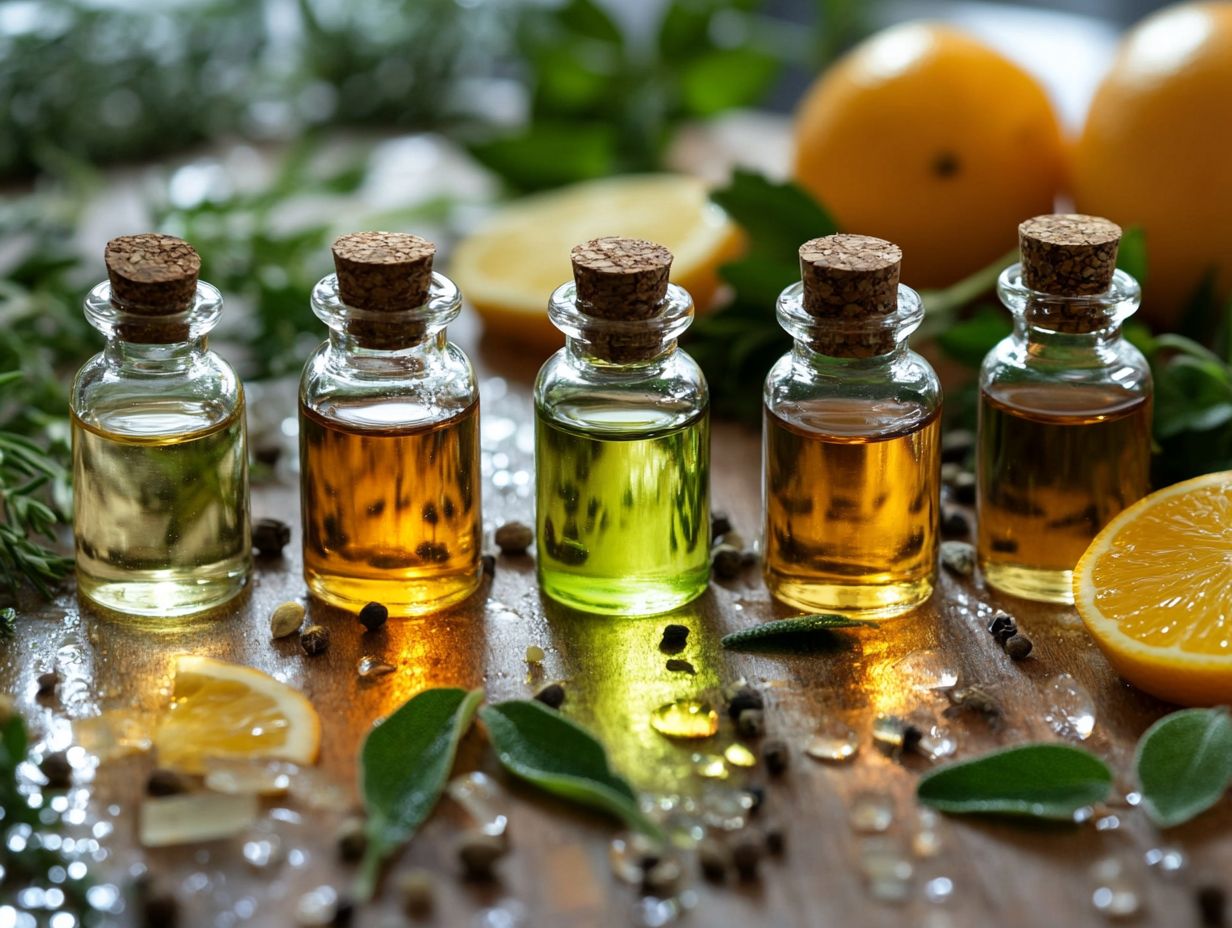
- Tea tree, eucalyptus, peppermint, lemon, and lavender oils are potent natural germ killers.
- Essential oils have multiple benefits, including improving respiratory health, boosting immunity, and reducing stress.
- Essential oils can be used for cleaning and disinfecting various surfaces, as well as for creating all-natural hand sanitizers and household cleaners.
- Frankincense, lemongrass, and cedarwood oils also offer significant antimicrobial properties, making them powerful natural cleaners.
1. Tea Tree Oil
Tea tree oil, celebrated for its powerful antimicrobial properties, is an essential part of many health practices, offering impressive health benefits, including natural disinfectants for skin irritations and infections. Derived from the Melaleuca alternifolia tree, this essential oil has captured the attention of healthcare professionals, including experts from the Cleveland Clinic, for its efficacy as a natural remedy.
Yufang Lin, MD, from the Cleveland Clinic, emphasizes that tea tree oil can serve as an alternative to traditional chemical disinfectants, making it a favored choice among herbalists pursuing holistic health solutions.
The extraction of tea tree oil typically involves steam distillation of the leaves and twigs, a method of extracting essential oils that uses steam to draw out the oil from plant material, preserving its potent properties. This versatile oil finds a multitude of applications, especially in skincare, where it effectively soothes acne, eczema, and fungal infections, while also functioning as a robust cleaning agent for household surfaces. Its antimicrobial properties also make it invaluable for natural disinfectants.
In contrast to conventional disinfectants, tea tree oil is praised for being gentler on both the skin and the environment. Its invigorating scent in aromatherapy promotes mental clarity and relaxation, enhancing your self-care routines.
It s important to dilute tea tree oil with a carrier oil, such as jojoba or coconut oil, to prevent any skin irritation. Herbalists often recommend this practice, especially for first-time users, ensuring safe and effective results from this remarkable essential oil.
2. Eucalyptus Oil
Eucalyptus oil is a remarkable essential oil that not only boasts a refreshing aroma but also offers a wealth of health benefits, particularly in enhancing respiratory well-being and uplifting your mood. Extracted from the leaves of the eucalyptus tree, this essential oil acts as a powerful natural disinfectant and finds its place in various aromatherapy practices.
You can easily combine it with other aromatic oils to create effective blends that help relieve the symptoms of colds and allergies, all while serving as a natural cleaner in your household.
Beyond its decongestant properties, eucalyptus oil is renowned for its ability to soothe irritation and inflammation in the respiratory tract, making it a preferred choice for anyone dealing with asthma or bronchitis. When used in aromatherapy, its invigorating scent can elevate your spirits and significantly diminish feelings of stress and anxiety.
The true magic of eucalyptus oil reveals itself when paired with complementary oils, such as peppermint or tea tree, enhancing their individual health and wellness benefits. Incorporating this oil into your daily routine is a breeze; simply add a few drops to a diffuser or mix it with a carrier oil for a calming massage.
This not only creates a serene atmosphere but also contributes to your overall health and well-being. Eucalyptus oil and cedarwood oil, when used together, offer therapeutic benefits in managing conditions like type 2 diabetes and Alzheimer’s disease.
3. Peppermint Oil
Peppermint oil stands out as a beloved essential oil, renowned for its invigorating scent and impressive health benefits, particularly its ability to enhance cognitive function and uplift your mood. Extracted from the peppermint plant, this scented oil has garnered extensive research attention for its stimulating properties, making it a preferred choice among herbalists and aromatherapists.
The benefits of peppermint essential oil go far beyond its delightful fragrance; it has been shown to sharpen focus and mental clarity, while also providing relief from headaches and digestive discomfort. Peppermint oil is also being studied for its potential benefits in combating the herpes simplex virus.
Peppermint oil is often used in aromatherapy to create an uplifting atmosphere that enhances concentration during work or study sessions. When applied topically, it s often blended with carrier oils neutral oils used to dilute essential oils before applying them to the skin and gently massaged onto your temples to alleviate tension or soothe sore muscles after a workout. In the culinary realm, this versatile oil can elevate the flavor profiles of various dishes, from refreshing beverages to mouthwatering savory meals.
For everyday use, consider adding a few drops to a diffuser in your workspace, incorporating it into your homemade skincare routines, or blending it into teas for a refreshing twist. By doing so, you can fully embrace the multifunctional advantages of this delightful essential oil.
4. Lemon Oil
Lemon oil, derived from the zest of lemons, is a dazzling essential oil celebrated for its uplifting fragrance and a plethora of health benefits, including enhancing your mood and sharpening cognitive function. Think of lemon oil as your natural cleaning superhero! This essential oil acts as a natural disinfectant, effortlessly cleansing surfaces and purifying the air when utilized in aromatherapy. Its refreshing scent not only invigorates your senses but also promotes mental clarity, positioning lemon oil as a critical ally in both household cleaning and wellness routines.
The bright, zesty aroma of lemon oil has the remarkable ability to transform any space, crafting an inviting and rejuvenating atmosphere. Incorporating this versatile oil into your daily rituals is a breeze; simply add a few drops to your cleaning solutions for an effective, natural disinfectant. Using a diffuser spreads the uplifting scent, creating a lasting positive mood.
For those seeking to enhance mental focus, a dab of lemon oil on your pulse points or a splash added to a warm bath can create a serene yet invigorating experience, making it an excellent companion for boosting your overall well-being. Lemon oil, along with bergamot, can be especially effective in mood improvement and cognitive function.
5. Lavender Oil
Lavender oil is a beloved essential oil celebrated for its calming properties and a host of health benefits especially its remarkable ability to elevate mood and promote relaxation. This versatile oil, extracted from the blossoms of the Lavandula angustifolia plant, has earned its place not only in aromatherapy but also as a powerful ally against various pathogens, thanks to its antimicrobial qualities. With its enchanting floral aroma, lavender oil has become a trusted remedy for stress relief, enhancing overall well-being in both personal care and therapeutic settings.
You ll find its applications to be numerous, ranging from natural stress reduction techniques to improving sleep quality, making it an essential staple in many homes. If you re grappling with insomnia or anxiety, consider integrating lavender oil into your nighttime routine whether through diffusing its soothing scent, applying it to your skin, or adding a few drops to a warm bath. This simple addition can create a tranquil environment that encourages relaxation.
Incorporating lavender oil into your skincare regimen can yield additional benefits; its antibacterial and anti-inflammatory properties can help calm irritated skin and minimize blemishes. Just remember, to fully harness its potential safely, it s vital to use diluted essential oil before applying it topically and consult with a healthcare provider regarding any specific health concerns.
How Do Essential Oils Kill Germs?
Essential oils possess remarkable antimicrobial properties that allow you to effectively eliminate germs, making them invaluable natural disinfectants in both your healthcare and household settings. These potent plant extracts, such as tea tree oil, eucalyptus oil, and lavender oil, have been thoroughly studied for their ability to combat various pathogens, including bacteria and viruses. Unlike traditional chemical disinfectants, essential oils offer a holistic approach to sanitation, promoting not only cleanliness but also your overall health and well-being through their aromatic and therapeutic qualities.
The antimicrobial activity of essential oils stems from their unique chemical composition, featuring compounds such as terpenes, phenolics, and aldehydes that disrupt microbial cell membranes and inhibit growth. For instance, you may find tea tree oil particularly effective against Staphylococcus aureus, a common skin infection, while eucalyptus oil has demonstrated promise against respiratory viruses. Additionally, frankincense oil and rosemary oil have shown antimicrobial properties that can be leveraged for natural disinfectants.
In contrast to chemical disinfectants, which often contain harsh substances that can irritate your skin and contribute to environmental pollution caused by chemical disinfectants, essential oils are generally regarded as safer alternatives and natural disinfectants. Their natural origin enhances your comfort and reduces the risk of harmful side effects, making them the preferred choice for those who prioritize eco-friendly and health-conscious sanitation solutions such as natural cleaners.
What Other Essential Oil Benefits Do These Essential Oils Have?
Along with their impressive germ-fighting capabilities, essential oils bring a wealth of health benefits that elevate both your physical and mental well-being. Imagine improving your mood and sharpening your cognitive function with just a few drops of aromatic oils. Oils like peppermint and lemon can invigorate your mind and support emotional balance, while lavender, eucalyptus, and frankincense are your allies in relaxation and stress relief.
The advantages of essential oils extend far beyond the surface, enhancing aspects of health such as sleep quality, digestive support, respiratory wellness, and even aiding in conditions like type 2 diabetes and Alzheimer s disease, making them essential companions in your holistic wellness journey.
These aromatic extracts can also provide relief from anxiety and depression, promoting emotional resilience when you need it most. If you’re looking to weave essential oils into your daily routine, consider simple yet transformative practices.
Diffusing a calming scent while you unwind at home can create a serene atmosphere, or adding a few drops of citrus oils to your morning water can invigorate your day. Topical applications, when using diluted essential oils in carrier oils, can target specific troubles like sore muscles or dry skin directly.
By leveraging the capabilities of nature in this manner, you can cultivate a more balanced and healthier lifestyle, enhancing your overall well-being one aromatic drop at a time through therapeutic practices.
How Can Essential Oils Be Used for Cleaning and Disinfecting?
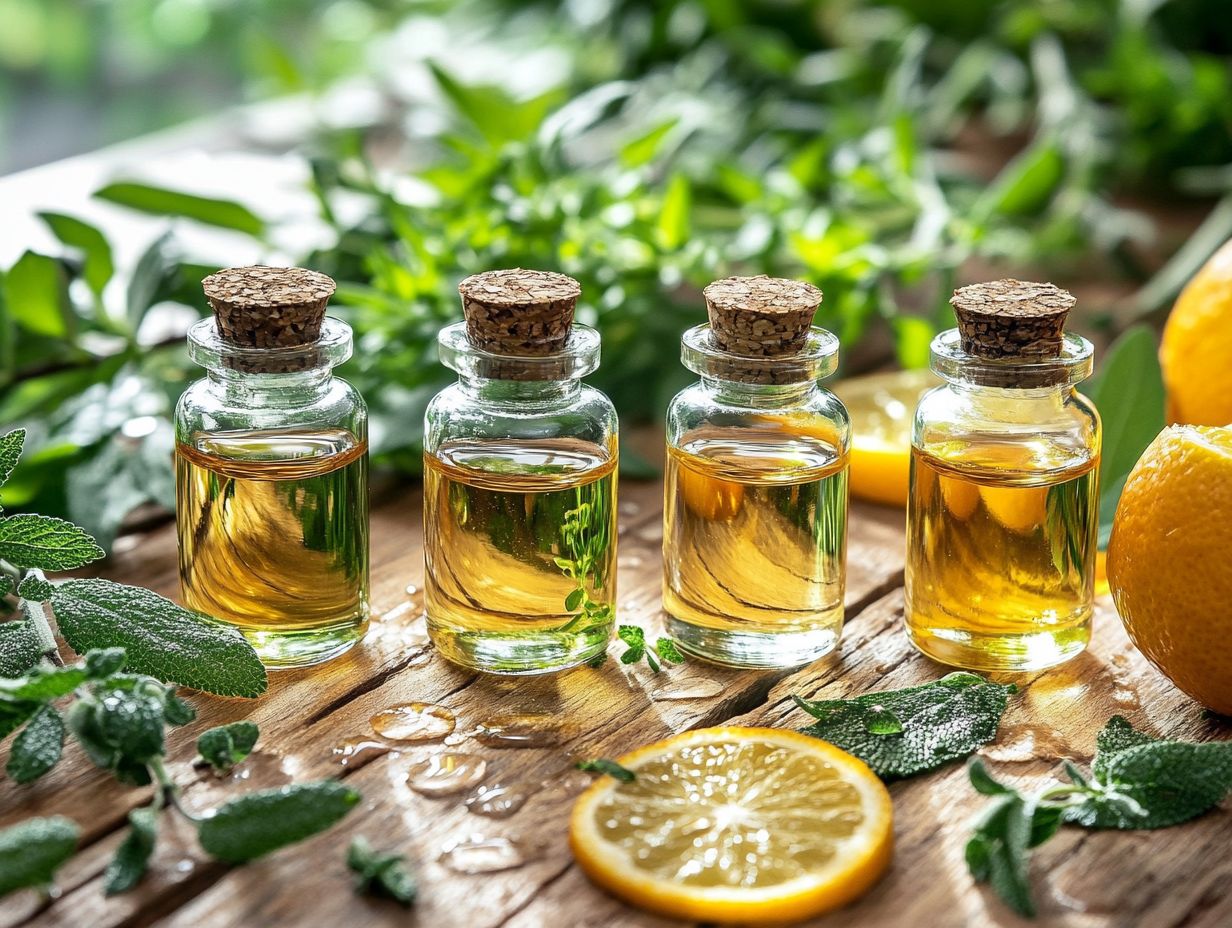
You can effectively utilize essential oils for cleaning and disinfecting, offering a natural alternative to the harsh chemical disinfectants commonly found in traditional cleaning products. Oils like tea tree and lemon boast strong antimicrobial properties, making them ideal for your homemade cleaning solutions, thanks to their antimicrobial activity, while their delightful scents work to refresh the air.
Herbalist recommendations often suggest blending various essential oils with carrier oils, creating potent yet safe cleaning products that not only sanitize surfaces but also enhance the indoor environment.
By incorporating essential oils into your daily cleaning routine, you not only reduce your exposure to toxic chemicals but also contribute to a more sustainable living space. For example, a simple all-purpose cleaner can be concocted with a mix of vinegar, water, and a few drops of lavender or eucalyptus oil, harnessing their antibacterial qualities while leaving behind a refreshing aroma.
Using essential oils like peppermint, rosemary oil, or orange oil can infuse your space with invigorating scents that uplift your mood.
Making the transition to these natural solutions ensures the safety of everyone at home, especially children and pets, while preventing exposure to herpes simplex virus, and minimizing the ecological footprint often left by conventional cleaning agents.
Are There Any Risks or Side Effects of Using Essential Oils for Killing Germs?
While essential oils are widely celebrated for their natural disinfectant properties, it s important to acknowledge the risks and potential side effects associated with their use, particularly when not properly diluted. Pure essential oils can pack quite a punch and might lead to skin irritation or allergic reactions if applied directly. This highlights the necessity of using a carrier oil for dilution. Understanding the correct usage and being aware of possible side effects is crucial for ensuring your safety while reaping the benefits of these aromatic treasures.
If you have sensitive skin, you may find that even diluted oils can provoke adverse reactions. This makes it all the more vital to conduct a patch test before committing to full application. This straightforward procedure involves applying a small amount of the diluted oil to a discreet area of skin and observing it for 24 hours to catch any unexpected reactions.
It s advisable to stick to dilution ratios ranging from 1% to 5%, depending on the specific oil and its intended use. By educating yourself on these safety precautions, you can mitigate the risks and fully embrace the therapeutic qualities that essential oils have to offer.
What Are Some Other Natural Ways to Kill Germs?
Along with essential oils, there are several natural methods for eliminating germs. These methods include a range of plant extracts and herbal remedies. Ingredients like vinegar, baking soda, and hydrogen peroxide stand out as effective natural disinfectants, often praised by herbalists for their antimicrobial properties. These choices not only offer a safer alternative to chemical disinfectants but also align beautifully with a greener lifestyle.
You ll find that these versatile ingredients can be effortlessly integrated into your daily cleaning routines, making them accessible for anyone eager to enhance their home s cleanliness without the unpleasant side effects of synthetic chemicals. For instance, you can whip up a simple all-purpose cleaner by mixing equal parts of vinegar and water in a spray bottle, perfect for wiping down countertops and disinfecting surfaces.
Baking soda can be transformed into a powerful paste when combined with water, enabling you to tackle tough stains and deodorize various spaces with ease. Meanwhile, hydrogen peroxide serves as a formidable disinfectant when used in a diluted solution. It is ideal for sanitizing cutting boards and other kitchen essentials due to its antimicrobial properties. Embracing these natural alternatives gives you the power to create a healthier home environment easily.
Want to enhance your healthy lifestyle? Incorporating essential oils can do just that!
Incorporating essential oils into your healthy lifestyle can offer many health benefits, from elevating your mood to boosting cognitive function, thereby enriching both your mental and physical well-being. These aromatic oils offer versatile applications whether through aromatherapy, topical use, or as natural ingredients in your cleaning products allowing you to adopt a holistic approach to health. You can enhance your wellness by adding essential oils to your routine.
Take lavender oil, for example; it’s celebrated for its calming effects and can easily change your space when added to a diffuser, creating a serene home environment, a practice endorsed by experts like Cleveland Clinic‘s Yufang Lin, MD. On the flip side, invigorating oils like peppermint can invigorate your spirit during a refreshing morning massage. For those who appreciate a tidy, toxin-free atmosphere, essential oils like tea tree oil, eucalyptus oil, and lemongrass can work wonders as natural components in homemade cleaning solutions. Regarding skincare, incorporating oils such as frankincense or rose can elevate your routine, providing much-needed hydration and nourishment due to the therapeutic properties of these oils.
Always follow safety guidelines to enjoy the full benefits of essential oils! Properly diluting oils and conducting patch tests will ensure compatibility with your skin type, allowing you to enjoy the full spectrum of their advantages without any setbacks.
Frequently Asked Questions
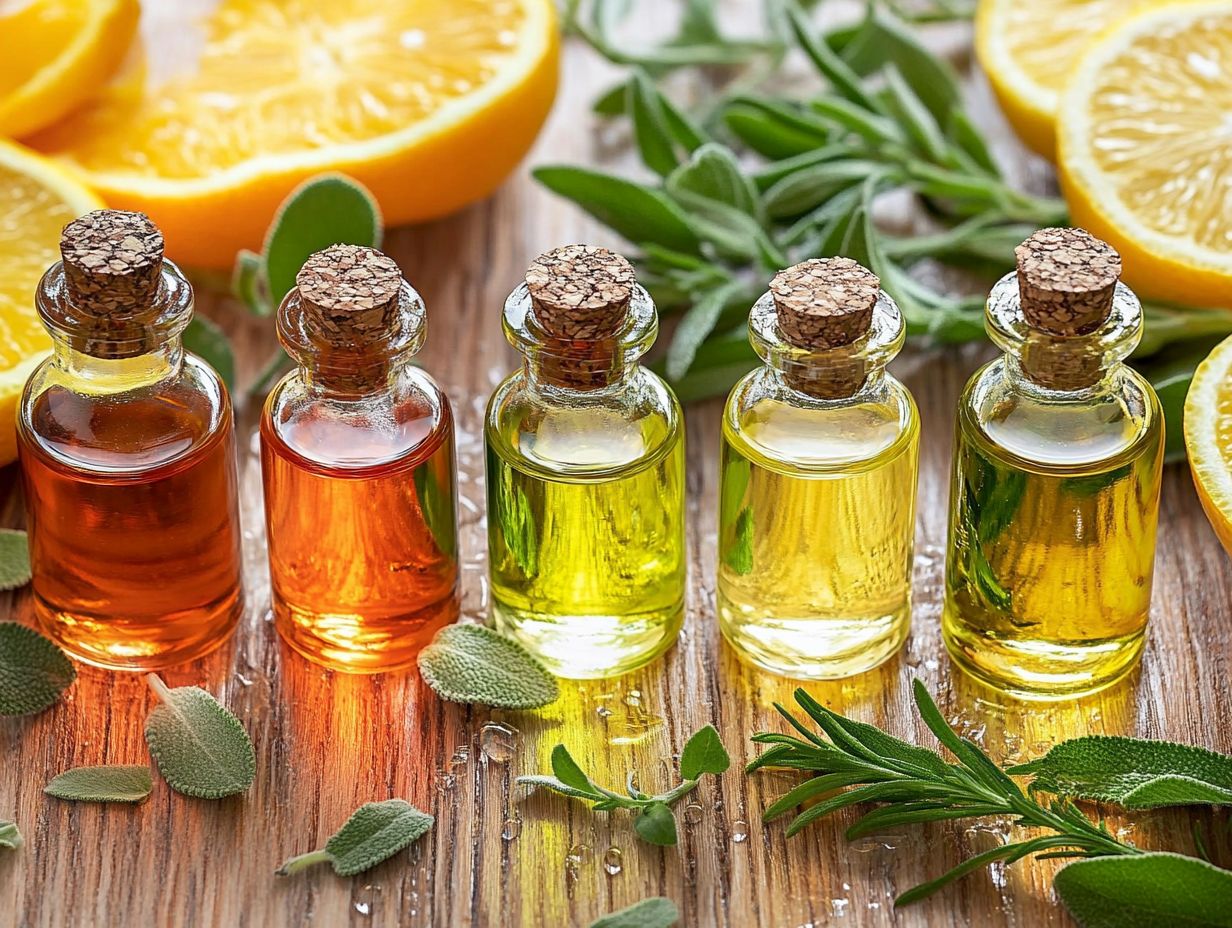
What are the top 5 essential oils that naturally kill germs?
The top 5 essential oils that naturally kill germs are tea tree oil, lavender oil, peppermint oil, eucalyptus oil, and lemon oil.
How do essential oils kill germs naturally?
Essential oils contain natural compounds that have antimicrobial properties, making them effective at killing germs and bacteria.
In what ways can I use essential oils to kill germs?
You can use essential oils to kill germs by diffusing them, adding them to cleaning products, or applying them topically to surfaces or your skin.
Are there any precautions I should take when using essential oils to kill germs?
Yes, it is important to always dilute essential oils before using them on your skin and to avoid ingesting them. It is also recommended to use caution if you have sensitive skin or are pregnant.
Can essential oils replace traditional cleaning products for killing germs?
No, while essential oils can be effective at killing germs, they should not be used as a replacement for traditional cleaning products. It is best to use essential oils in addition to regular cleaning practices.
Are there any essential oils that should be avoided when trying to kill germs?
Yes! While many essential oils can effectively kill germs, some may be harsh on your skin.
It’s important to do your research and talk to your doctor before using any oils for this purpose.

